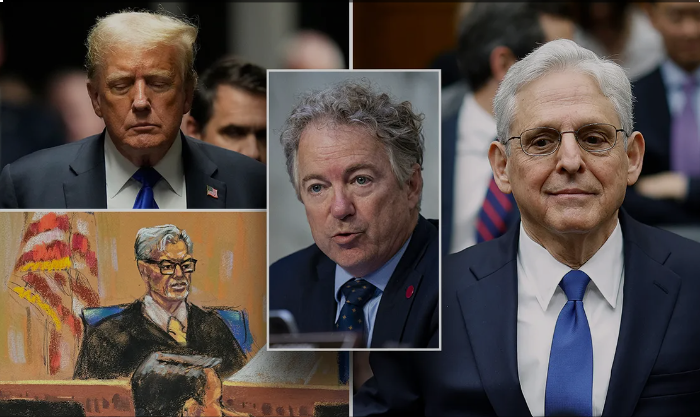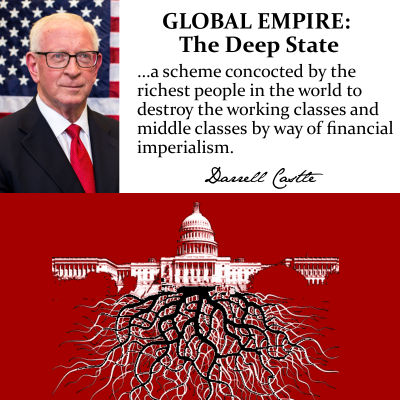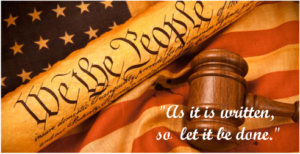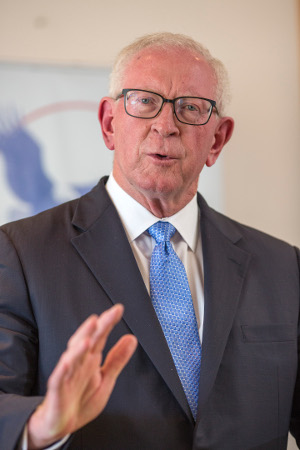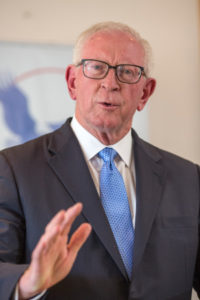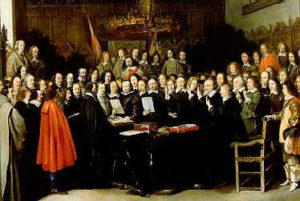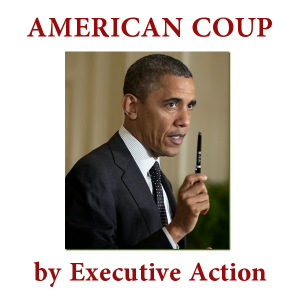Podcast: Download
Darrell Castle talks about the conviction of Donald Trump on 34 felony counts in New York last week in America’s first Stalinist show-trial designed to be an example of what could happen if you challenge the prevailing ideology of our new post rule of law, post bill of rights, nation.
Transcription / Notes
CHALLENGING THE POWERS THAT BE
Hello, this is Darrell Castle with today’s Castle Report. This is Friday, the 7th day of June in the year of our Lord 2024. I will be talking about the conviction of Donald Trump on 34 felony counts in New York City last week. This was America’s first Stalinist show trial designed to be an example of what could happen to normal people if they challenge the prevailing ideology of our new post rule of law, post bill of rights, nation.
Before I get into the conviction, I will remind you once again that yesterday, the 6th of June was the 80th anniversary of the D-Day landings on the coast of France. Hundreds of thousands of young men were sent ashore in Normandy to confront the Nazi army that enslaved Europe. Thousands of them died that day but they all knew that death was a real possibility for them and yet they went anyway. When I see the thousands of crosses in the Normandy cemeteries today my first thought is what a terrible waste.
What private at Omaha Beach or Lieutenant on Utah would have become a great doctor, but now many thousands have been deprived of his care. What Canadian sergeant would have become prime minister of Canada thus sparing us the horrible Pierre Trudeau and his much worse son Justin. These are all things that we can’t know because they are all dead, but there is one thing of which I am certain and that is that the nation is no longer worthy of them because they fought to preserve something that has been squandered as you will hear in this report.
In my analysis of Trump’s conviction, I looked around for some quote, and some examples with which I could illustrate what happened and reveal the depths to which we have sunk as a people. The best quote is from the chief of Stalin’s secret police Lavrenti Beria. “Show me the man, I’ll show you the crime.”
Professor Alan Dershowitz said that Judge Merchan took Stalin one step further because a day after the ruling and verdict he still didn’t know what the crime was. The prosecution didn’t bother or was unable to define the alleged crime that Trump allegedly committed. That didn’t matter because the judge told the jury in his instructions that they didn’t have to agree or even know what the crimes were as long as they had a belief that criminal acts were committed. This was, therefore, one of the greatest miscarriages of justice in U.S. history.
So, what was the crime of which he was supposedly guilty? We still don’t know exactly what the jury decided because apparently even they didn’t know what the crime was. A biased judge who refused to recuse himself apparently because he was hand selected for the purpose of a conviction. A biased jury and a biased prosecutor who ran for office on the promise of finding a crime to prosecute Trump for. The prosecutor and the system tried to follow Chief Beria’s statement but try as it did no crime could be found so they just made one up or invented one.
This is a stain on the system of law and justice in America and it makes it difficult to ever respect such a system again. If this verdict holds then be afraid because this is no longer America but instead it has morphed into a Stalinist system of terror from above. If we are to have hope for this country, for our system of individual rights, this decision must be overturned without a lot of delay and bureaucratic wrangling.
There used to be a sacrosanct system of standards, and everyone knew that the integrity of the system for all of us was more important than the evidence or lack of it against any one criminal defendant. First, there had to be a victim, a step missing from Trump’s trial. Victims would come forward to the system and allege that a crime had taken place. Professional police officers and detectives would investigate and if evidence warranted a suspect would be found and then prosecutors, separate from the police, would bring charges. The suspect, as we all know, would be presumed innocent until the prosecution proved every aspect of the law beyond a reasonable doubt. Now, that sacrosanct system is completely distorted and broken.
Politicians run for elected office like District Attorney or State Attorney General with the same zeal and the same promises to the same people as any other politician running for any other office. They are often funded by people like George Soros who want them in office because they will help him unleash chaos, disrespect, and doubt into the system. Most of all, they bring fear because no one is safe from their prosecutions or from the criminals they release to prey on the innocent.
They used to investigate a crime to find an individual suspect if one existed, but now they investigate a specific individual to find a crime even if it means inventing a crime where none exists. They then select the jurisdiction most suitable to them where virtually no one in the potential jury pool holds any political view different from the prosecution. The jurisdiction must be one where the defendant is hated so there is no chance whatsoever of a fair trial. That’s not enough for our new system though, the prosecutors must find a judge who is completely corrupt and sold out to the new ideology.
In our present case the judge’s daughter is a fund raiser for the Democratic Party and has raised millions for them. The judge imposed a gag order on Trump to keep him from talking about it and would allow no testimony about his daughter. The judge also contributed money to the Biden campaign. Oh yes, I know Joe Biden had nothing to do with this trial that is evident from his smirk after the verdict. That’s why the Biden department of injustice sent a prosecutor to New York to handle the prosecution because Bragg didn’t have the skills or confidence to do it.
Sad, but this is our system now. A member of the ruling elite, whichever one is in power at the time, can just point his thumb up or down like Ceasar at the Colosseum and that means death for the accused who had the audacity to oppose Ceasar. Today it isn’t gladiators who deliver the killing blow but dozens of federal agents with a laundry list of charges.
Since we are talking about ancient history and the Roman Empire, let me take you to ancient Greece for a moment where this thing we now refer to as democracy began. The word justice comes from the Latin word justitia which means righteousness. Quite appropriately those who applaud the verdict are full of righteousness albeit the self- righteousness-kind. Their cheering at the demise of the centuries old American system of law and individual rights adds emphasis to the fact that we have given our system over to a group of ignorant barbarians who only know they won. They, from the president on down, don’t seem to care that their victory has destroyed the protection of law for all of us.
What was Donald Trump’s crime that so offended Ceasar? He had the audacity to run for political office again and he refused to back down. Democrats were advised after the verdict by the son of George Soros, Mr. Alex Soros, to always refer to Trump as a convicted felon so the word was out to the media from the man himself. Maybe these end-zone celebrations will backfire and start to bother even those who hate Trump and despise his opposition to this evil system as it now exists. Perhaps their referring to him as a convicted felon will be a rallying cry and a badge of honor. Perhaps this trial will make it more likely that Trump will be elected rather than less likely.
Americans have always had a soft spot for the underdog. Who would not want a team to prevail if they knew that the referees had been cheating for the opposition and therefore the victory was not justice but injustice. It appears that they are very afraid of Donald Trump and that is itself a badge of honor for Trump. Anyone they are afraid of must be someone to be considered worthy. This case had nothing to do with law and those of us who are not totally perverted know it. This case is disgraceful and as Tucker Carlson said anyone who defends it is a threat to you and your family.
This is an age-old dilemma that we face as Americans, but we have always relied on our Constitution and the law to protect us from the perversions of individuals. Just to reiterate a few things, it is a case brought by a prosecutor who could show no one harmed. It is doubly frightening because there are literally no legal grounds for bringing it and yet the powers who are supposed to rule over and protect the system said nothing. The bar associations, the law schools and most of all the media said nothing. None of the watchdogs said anything and that scares me more than the verdict.
This age-old dilemma with which our enemies were confronted was that getting Trump was so important that it justified any means, even perverted ones. This is the decision of fascists everywhere as learned from their mentor Benito Mussolini who decided that joining the Nazis was OK if it could help him restore the Roman Empire. We see quite often today the bogey man who is so bad that unjustified war or unjustified perversions of the system are now justified. Since the real crime of Trump was attempting to get elected, the prosecutor and judge have interfered with and perverted the election of the next president.
The people who are cheering the verdict will one day fall victim to this perversion and I wish they could understand that they have destroyed the system. One day, inevitably, they will say the wrong word, use the wrong pronoun, or have a wrong thought. Perhaps they will fail to bend the knee to Ceasar or fail to obey Ceasar when he gives them the thumb up or down. Perhaps they will refuse or regret not participating in whatever virtue signaling is next on the self-righteous woke agenda. If any of those happen, they could end up on the business end of the perverted justice system they just helped to create. They are full of blood lust now, but this new legal standard applies to them as well.
By a strange coincidence, the day of Trump’s verdict, May 30th was the anniversary of the death of Joan of Arc. 593 years ago. That fact came to my attention because of an article written by Msgr. Richard Antall for Crisis Magazine. Since I am a lifetime admirer of Saint Joan, I mention her struggle to you now. Saint Joan was burned at the stake on May 30, 1431, when she was just 19 years old. She was a peasant girl born to a family of sharecroppers in rural France. She was a devout Catholic, as was most of France, but she kept having visions that God told her he wanted her to lead an effort to free France from English occupation. Her time was near the end of the Hundred Years War between France and England, so desperate times for France.
Despite the objections of many, including the church, she led the French army to victory at the battle of Orleans. Her time was much like ours in that those who oppose the powers that be would not and could not be tolerated. Joan was persecuted and vilified over the next year and a kangaroo court made up of English and even French traitors convicted her of blasphemy. She was executed by burning on May 30th, 1431, at age 19. In 1920 she was made a saint of the Catholic Church and a bronze statue of a heroic Joan in full battle armor on her warhorse stands in Paris. The date of her death is a national holiday in France, so it took a while, and a revolution first had to destroy the church and the royalty, but the French people refused to let go of this peasant girl who became a great warrior.
Will the American people eventually see Donald Trump as valiant warrior who refused to back down to a group of corrupt officials, and one who sacrificed himself for us. Time will tell I guess, but one wonders whether we will ever welcome him into history as a national hero as the French people finally did for Joan. One thing is for certain and that is that his enemies who hate him and wish death for him have elevated him to be one of the most important Americans in history.
Finally, folks, I don’t think this will end here. Perhaps Donald Trump will pull on his armor, mount his warhorse, and lead his people to victory, sacrificing himself in the struggle. Perhaps those enemies of individual rights, of the truth, of the light, of the church, will prevail. Time will tell.
At least that’s the way I see it,
Until next time folks,
This is Darrell Castle,
Thanks for listening.
Photo Credit: Fox News
